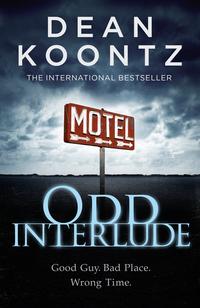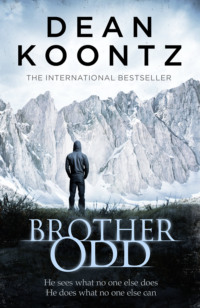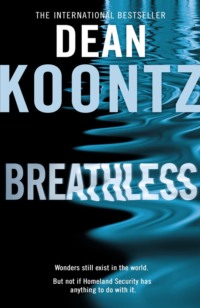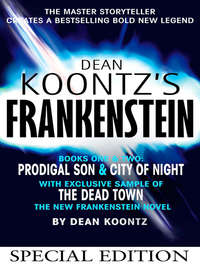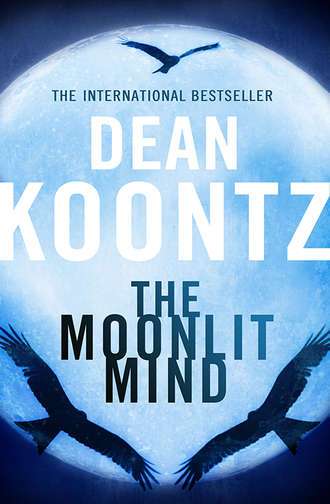
Полная версия
The Moonlit Mind: A Novella
The boy looks away from them. He takes up the slack in the leash, and brings the dog to his side.
Fifty yards or so from the VFW post, he dares to look back, half expecting the men to be following him. They are where he last saw them, smoke pluming from their mouths as if their souls must be on fire.
At the end of the block is a nightclub called Narcissus. No smokers loiter outside. The windows are two-way mirrors, offering no view of the interior.
A tall man stands beside a taxi. He assists a woman from the vehicle.
His dark hair is slicked back. His cheeks are rouged, his lips bright red. His face is painted like that of a ventriloquist’s dummy, with prominent laugh lines from his nose to the corners of his mouth. The woman’s makeup matches the man’s.
Attached to their white clothes at key points are thick black strings that have been broken. They are not costumed as ventriloquists’ dummies but instead as marionettes freed from their puppet master.
The man says to Crispin, “What a handsome dog,” and the woman says, “Your sister tasted so sweet.”
The encounter is by chance, but you can be killed by chance as easily as by someone’s design.
The dog runs, the boy runs, the man snares the boy by his jacket, the leash jerks from the boy’s hand, and the boy falls …
4
Before Crispin went on the run …
He lives with his younger brother, Harley, and his little sister, Mirabell. They share a house with their mother, Clarette.
Each child has a different father because many men are drawn to their mother.
Clarette is so beautiful that one of her in-between boyfriends—in between the rich ones—tells Crispin, “Kid, your mom she’s like the magical princess in some fairy-tale cartoon movie, how she can charm kings and princes, even make animals and trees and flowers swoon and sing for her. But I never did see a cartoon princess as smokin’ hot as she is.”
At that time Crispin is seven years old. He understands the princes, animals, trees, and flowers part. Years will pass before he knows what “smokin’ hot” means.
Their mother is drawn to many men, not because their beauty matches hers but because of what they are able to do for her. She says that she has expensive tastes and that her “little bastards” are her ticket to the good life.
Each of their fathers is a man of great prominence for whom the existence of a little bastard would not only be an embarrassment but also a wrecking ball that might smash apart his marriage and lead to an expensive divorce.
In return for specifying on each birth certificate that the father is unknown, Clarette receives a one-time cash payment of considerable size and a smaller monthly stipend. The children live well, though not nearly as well as their mother, because she spends far more freely on herself than on them.
One night, she enjoys too much lemon vodka and cocaine. She insists that eight-year-old Crispin cuddle with her in an armchair.
He would rather be anywhere else but in her too-clingy arms and within range of her exotic breath. When she is in this condition, her embrace seems spidery, and for all her expressions of affection, he expects that something terrible will happen to him.
She tells him then that he ought to be grateful that she is so smart, so cunning, and so tough. Other women who make their living by giving birth to little bastards are likely sooner or later to have a well-planned accident or to become a victim of a supposedly random act of violence. Rich men do not like to be played for fools.
“But I’m too quick and bright and clever for them, Crispie. No one will take your mommy from you. I’ll always be here. Always and always.”
Time passes and change comes.…
The change is named Giles Gregorio. He makes the other rich men in Clarette’s life seem like paupers. His wealth is inherited and so immense as to be almost immeasurable.
Giles has palatial residences all over the world. In this city, he lives atop Shadow Hill, directly across the street from the fabled Pendleton. His mansion—called Theron Hall—is not as large as the Pendleton, but large enough: fifty-two rooms, eighteen baths, and a maze of hallways.
When Giles intends to be in town, twenty servants precede him by a week, readying the great house. Among them are one of his personal chefs, his junior butler, and his junior valet.
Two weeks after Clarette meets the multibillionaire, cuddling again with her oldest son, once more under the spell of lemon vodka, she speaks of a glorious future. “I’ve changed my business model, Crispie. No more little bastards. No more, no more. Mommy’s going to be richer than she ever dreamed of being.”
Just a week later, three weeks after Giles met Clarette, they are married in a private ceremony so exclusive that even her three children are not in attendance. In fact, watching arrivals from a high window, Crispin thinks that fewer than twenty people come to Theron Hall on the day and that more servants than guests must be witness to the wedding.
Crispin is nine then, Harley seven, Mirabell six.
He and his younger siblings are confined to a second-floor drawing room for the duration of the celebration, where they are showered with fabulous new toys, fed all their favorite foods, and watched over by Nanny Sayo, who is Japanese. Petite and pretty, with a soft, musical voice, Nanny Sayo is quick to laugh, but any test of her authority is met with the displeasure of a stern disciplinarian.
Following the wedding, all the many servants at Theron Hall are respectful of the children and even treat them with affection. But it seems to Crispin that when these people smile, the expression in their eyes does not match the curve of their lips.
Yet life is good. Oh, it is grand.
The children eat only what they like.
They go to bed only when they wish.
Each rises to his or her own clock.
They are schooled at home by a tutor, Mr. Mordred. He is deeply knowledgeable in all subjects. He is most entertaining and can make any topic interesting.
Mr. Mordred is a jolly man, not exactly fat but well-rounded, and sometimes he tells little Mirabell that she looks good enough to eat, which always makes her giggle.
Perhaps the best thing about Mr. Mordred is that he doesn’t press them hard on their lessons. He allows them to break frequently for play, in which he often leads them.
When they are mischievous, he sometimes encourages them. When they are in a lazy mood, Mr. Mordred says that any child who isn’t lazy must not be a child at all but instead a dwarf masquerading as one.
On his left temple, Mr. Mordred has a black birthmark shaped exactly like a horsefly. When any of the children puts a finger to this oddity, Mr. Mordred makes a buzzing sound.
Now and then he pretends to mistake this image of a fly for the real thing. He twitches as if annoyed and slaps at the imagined insect with the flat of his hand, which always makes the children burst into laughter.
If Crispin were burdened with such a birthmark, he would be self-conscious about it, even embarrassed. He admires Mr. Mordred for finding reason to be amused even by this disfigurement.
One day, three weeks after the wedding, Crispin and Harley and Mirabell spend a couple of hours sprawled on the library floor with bundles of new children’s picture books and lots of cool comic books that Giles has bought for them. When at last they become bored, Nanny Sayo retrieves the scattered reading material to stack it on a table.
At one point, Crispin turns and finds himself standing over the woman as she kneels to gather the discarded comics. He is looking down the scooped neck of her blouse, where he sees on the curve of one breast a birthmark identical to that on Mr. Mordred’s forehead.
As if she is aware of his attention, Nanny Sayo begins to raise her head. Crispin turns away, flustered, before their eyes can meet.
Although he is only nine, he is embarrassed to have been staring at her breasts, the sight of which has affected him in some new and disturbing way that he can’t define. His face burns. His heart knocks so loud he thinks Nanny Sayo must hear it.
Later, in bed, he wonders how Mr. Mordred and Nanny Sayo can have the same birthmark. Maybe it’s something contagious, like a head cold or the flu.
He feels sorry for Nanny Sayo, though at least her disfigurement is in a less visible place than Mr. Mordred’s.
That night he dreams of Nanny Sayo dancing naked in firelight. She has several horsefly birthmarks, not just one, and they are not fixed. They crawl across her skin.
Crispin wakes in the morning with a fever, plagued by nausea and aching muscles.
His mother says that he’s just caught a virus. Antibiotics won’t help him cast off a virus. He must remain in bed a day or two until it passes. She sees no need to call a doctor.
During the day, Crispin reads and takes short naps and reads again. The book is an adventure story set at sea and on various tropical islands.
Although the author has kept the tone light and has never put the young leads in any danger that they couldn’t handily escape, although no characters in the novel are named Crispin or Harley or Mirabell, near twilight he turns the last page and reads this line: And so the little bastards were slaughtered, Mirabell and then Harley and last of all young Crispin, slaughtered and left to rot, to be fed upon by rats and sharp-beaked birds.
In disbelief, Crispin reads the line again.
His heart races, and he cries out, but the cry largely dies in his throat. He drops the book, throws off the covers and erupts from bed. As he gets to his feet, dizziness overcomes him. He totters a few steps, collapses.
When he regains consciousness, he knows that little time has passed because the formerly pending twilight has just arrived. The sky beyond the windows is purple pressing toward a red horizon.
His dizziness has passed, but he feels weak.
He gets to his knees, claws the book from the bed, and dares to read the last page again. The words he saw before are gone. No mention is made of Mirabell, Harley, Crispin, slaughter, rats, or sharp-beaked birds.
With trembling hands, he closes the book and puts it on the nightstand.
Wondering if a delusion born of fever had put the words before him on the page, he returns to bed. He is more worried than afraid, but then more confused than worried, and finally exhausted.
A chill overtakes him. He pulls the covers up to his chin.
When Nanny Sayo rolls a service cart into his room with a bed tray that holds his dinner, Crispin first intends to tell her about the threatening words in the book. But he is embarrassed to have been so frightened by something that, in the end, proved to be entirely imaginary.
He doesn’t want Nanny Sayo to think he is, at nine years of age, still a big baby. He wants her to be proud of him.
His sick-boy dinner consists of lime Jell-O, buttered toast, hot chocolate, and chicken noodle soup. Anticipating that her patient might not have much appetite, that he might take his dinner in fits and starts, Nanny Sayo has put the chocolate and the soup in separate thermos bottles to ensure that they stay warm.
When Crispin expresses disinterest in the food, Nanny Sayo leaves the footed tray on the cart.
She perches on the edge of his bed and urges him to sit up. As Crispin leans against the headboard, Nanny Sayo takes his hand to time his pulse.
He likes watching her face as she stares solemnly at his wrist, counting his heartbeats.
“Just a little fast,” she says.
A curious disappointment overcomes him when she lets go of his wrist. He wishes she would continue to hold his hand, though he does not know why he has this desire.
He is consoled when she presses one hand to his forehead.
“Just a little fever,” she says, though it seems to him that her palm and slender fingers are hotter than his brow.
To his surprise, she undoes the first two buttons of his pajama top and places her delicate hand on his chest. She has already taken his pulse. He doesn’t understand why she would need to feel the thump of his heart, if that is indeed what she’s doing.
She moves her hand slowly back and forth. Slowly and smoothly. Smoothly.
He almost feels that she could make him well just by her touch.
Removing her hand from his chest, leaving the buttons undone, she says, “You’re a strong boy. You’ll be well soon. Just rest and eat all your dinner. You need to eat to get well.”
“All right,” he says.
She stares into his eyes. Her eyes are very dark.
She says, “Nanny knows best.”
In her eyes, he sees twin reflections of himself.
“Doesn’t Nanny know best?” she asks.
“I guess so. Sure.”
He sees the moon in her eyes. Then he realizes it is only a reflection of his bedside lamp.
“Trust Nanny,” she says, “and you’ll get well. Do you trust Nanny?”
“Oh, yes.”
“Eat your dinner before you go to sleep.”
“I will.”
“All your dinner.”
“Yes.”
Leaning forward, she kisses his brow.
She meets his eyes again. Her face is very close to his.
“Trust Nanny.”
On her breath is the scent of lemons as she kisses one corner of his mouth. Her lips are so soft against the corner of his mouth.
Nanny Sayo is almost to the door before Crispin realizes that she has risen from the edge of his bed.
Before stepping into the hallway, she looks back at him. And smiles.
Alone, watching TV but comprehending none of what he sees, Crispin eats the Jell-O. He eats the buttered toast and drinks the hot chocolate.
He isn’t delirious anymore, but he’s not himself, either. He feels … adrift, as though his bed is floating on a placid sea.
The chicken noodle soup will be too much. He will eat it later. Nanny Sayo has said that he must.
After returning the tray to the cart and after visiting the bathroom—he has one of his own—Crispin settles in bed once more.
He turns off the TV but not the bedside lamp. Night waits at the windows.
Tired, so tired, he closes his eyes.
In spite of having eaten the toast and drunk the hot chocolate, he can still vaguely taste her lemony kiss.
He dreams. He would not be surprised if he dreamed of Nanny Sayo, but he dreams instead of Mr. Mordred, their teacher.
Crispin, Harley, and Mirabell are sitting at a reading table in the library. Mr. Mordred strides back and forth in front of a row of bookshelves, holding forth on some subject, delighting them with his stories. In the dream, Mr. Mordred doesn’t have a horsefly birthmark on his left temple. His entire head is that of a giant horsefly.
Dream leads to dream, to dream, until he is awakened by a sound. A swishing-scraping noise.
The clock reads 12:01 A.M.
So weary that he can’t fully sit up, Crispin lifts his head from the pillow just far enough to survey the room for the source of the noise.
The bed tray stands on the cart, where he last put it. On the tray, the thermos of chicken soup wobbles around and around on its base, as if something inside is turning, spinning, impatient for Crispin to unscrew the cap and pour it out.
He must be delirious again.
Lowering his head to the pillow, closing his eyes, he thinks of her slender hand upon his chest, and soon he sleeps.
In the morning when he wakes, the cart is gone and the tray with it. He hopes that a maid removed it and that Nanny Sayo will not have to know that he failed to eat her soup.
He never wants to disappoint her.
Crispin loves his nanny.
In two days, he regains his health.
When he is well again, after showering, he stands naked in the bathroom, studying himself in a full-length mirror, searching for the detailed silhouette of a horsefly. He can’t find one.
For reasons he is unable to put into words, he believes that he has narrowly escaped something worse than a birthmark.
His embarrassment and worry do not last. Soon he lapses back into the relaxed and carefree rhythms of Theron Hall.
Crispin, Harley, and Mirabell eat only what they like. Chef Faunus and Cook Merripen cater to their every desire.
They go to bed only when they wish.
Each rises to his or her own clock.
Mr. Mordred entertains. Nanny Sayo attends the children’s needs.
The world beyond the great house has been fading from Crispin’s mind. Sometimes, passing a window, he is surprised to see the city, the Pendleton looming across the street.
Shortly before midnight on July 25, having been in bed less than two hours, Crispin swims up from a troubled sleep. Half awake, he sees two shadowy figures in his room, the place brightened only by the hallway light that seeps in through the door, which is ajar no more than two inches.
The visitors are talking softly to each other. One voice is that of Giles, whom the children now call Father. The other belongs to Jardena, Giles’s mother.
Jardena looks old enough to be her son’s great-grandmother. She keeps almost entirely to her suite of rooms on the third floor. She is withered, her face as drawn as a sun-dried apple, but her eyes as lustrous and purple as wet grapes. She’s seldom seen, almost always at a distance, at the farther junction of hallways, floating by in one of her long dark dresses.
Crispin hears little of what they say, though it seems that tomorrow is some kind of memorial or feast day. Before he slides away into sleep once more, the boy hears the names Saint Anne and Saint Joachim.
When he wakes in the morning, Crispin is not sure that the visitors to his room were real. More likely, they were part of his otherwise unremembered dream.
In the coming night, something happens to Mirabell.
5
Halloween, three years and three months later …
The leash jerks from the boy’s hand, and he falls.
The previously gentle dog, never having growled, does not growl now, but bites. He nips at the ankle of the male marionette in the white suit, who cries out and lets go of Crispin’s jacket.
The boy sprints after the dog, away from the nightclub called Narcissus. They plunge into the street, dodging cars as brakes shriek and horns blare.
From the comparative safety of the next sidewalk, Crispin looks back across the street and sees the man on one knee, examining his bitten ankle. The woman in white is talking on a cell phone.
Crispin snatches up the dropped leash, and the dog sets off with purpose. He and Harley weave between the pedestrians, half of whom are costumed for Halloween, half not.
When the hunters are hot on the scent, some places are safer than others. Certain churches, not all, seem to foil these particular pursuers. Sanctuary can be found in that kind of church—whether Baptist or otherwise—in which, on Sundays, rollicking gospel songs are sung with gusto and booming piano. Churches in which Latin is sometimes spoken, candles are lit for the intention of the dead, incense is sometimes burned, and fonts of holy water stand at the entrances—those are also secure. Synagogues are good refuges, too.
Right now, he and Harley are a few dangerous blocks from any such a safe haven.
Reverend Eddie Nordlaw, who founded the Crusade for Happiness and who appears Sundays on his TV show, The Wide Eye of the Needle, preaches that God wants everyone to be rich. He operates from his megachurch, the Rapture Temple, on Joss Street, which is not far from here.
But Crispin has learned the hard way that the Rapture Temple offers no more protection against these enemies than does a shopping mall. Or a police station.
On the day of his mother’s wedding, when he watched from a high window, one of the honored guests whom he saw arriving was the chief of police.
Pedestrians admonish and curse Crispin as he pounds pell-mell after the bolting dog, holding fast to the leash and trying not to be jerked off his feet.
Water in motion can also screen Crispin from Giles Gregorio and everyone like him. A rushing stream, if it is wide enough, thwarts them. Even if the boy stands on the farther bank from them, in plain sight, they seem unable to see him and eventually give up the search.
In Statler Park, a man-made waterfall tumbles into a fake-rock pond. A narrow pathway allows you to walk behind the falls, where there is a grotto. In that sequestered hollow, you can look out toward the park, through the cascades. The hunters must know of that retreat; but Crispin has several times been safe there while they stalked him through the rest of the grounds.
Rushing torrents seem not only to deny them his scent but also to confuse their senses, as though the swish and burble of the water is not merely sound but also a language, as if Nature is speaking a dispensation to spare him from their homicidal fury.
He and the dog are at this moment far from Statler Park and no nearer any rushing stream. Their best hope is Memorial Plaza, two acres of granite cobblestones, raised planters full of flowers, and benches on which people sit to read the morning paper, to have a bite of lunch, to feed the pigeons, and even to contemplate the sacrifices made by soldiers, sailors, airmen, and marines who have died to keep them free.
Harley knows the city as well as Crispin does. Soon cobblestones are underfoot. At this hour, the lamplit plaza is deserted because, for everyone except Crispin and his dog, such places are dangerous after dark in this part of town.
At the center of Memorial Plaza, on a granite plinth twelve feet in diameter, stand three larger-than-lifesize bronze figures: marines in battle gear, one of them wounded and leaning on another, the third carrying Old Glory as if defiantly announcing their location to an adversary they do not fear.
These days, the city is operating with such an enormous budget deficit that the plaza lamps and the spotlights on the statuary are extinguished at nine o’clock to save electricity. All is dark but for the lunar lamp.
The sounds of celebrations ring in from surrounding streets.
Harley springs onto the plinth, and Crispin scrambles after him. The slab of granite is carved to represent a stony outcrop, as if the bronze marines stand atop a battle-blasted hill. Among those sculpted rocks is a place where a boy and a dog can nestle.
They are less than half concealed. Even without the spotlights that used to wash the statues, the boy and the dog should be visible to anyone passing by, for the moon is full.
Yet Crispin is confident that they are safe. They are safe in the company of these bronze heroes.
The woman in white, black strings dangling, rushes into the plaza. Moonglow powders her marionette face, and her blood-red lips look black.
While the woman surveys her surroundings, the boy half believes that he can hear her doll eyes click-click-clicking as she blinks, as if she is in fact an animated puppet.
Her gaze passes over him from right to left, then slowly left to right.…
She doesn’t hesitate or come closer. She turns and moves away toward another part of the plaza.
Proximity to certain symbols and images can make boy and dog invisible to this woman’s kind, as surely as does swift-moving water. Statues honoring acts of courage and valor. Certain religious figures carved or cast life-size or larger. The immense mural of Aleksandr Solzhenitsyn on the front wall of the Russian-American Community Center. The huge cast medallion of America’s sixteenth president embedded above the main entrance of Lincoln Bank on Main Street.
A cross or a serviceman’s medal worn around the neck will not provide invisibility. The symbol needs to be of substantial size to be effective, as if the noble efforts and the determination of those who created and erected it are as important as the symbol or image itself.



